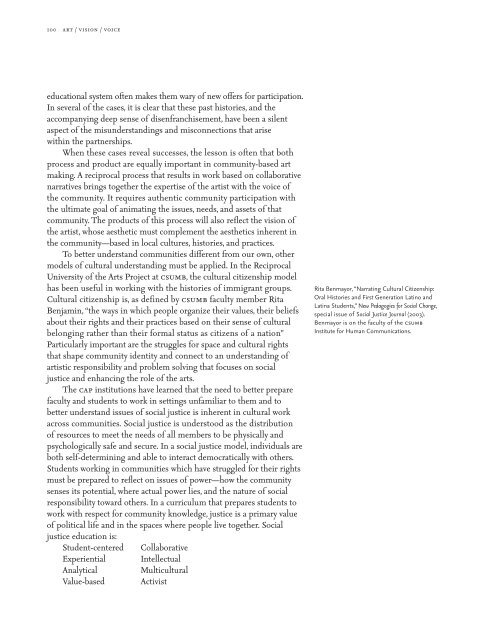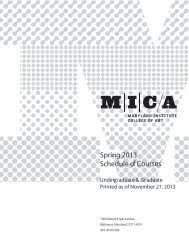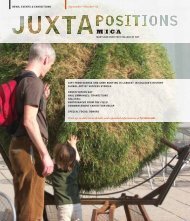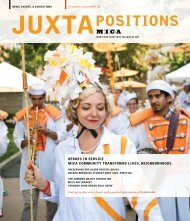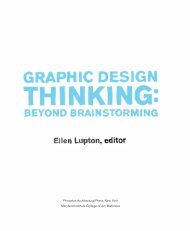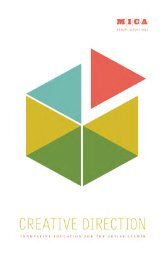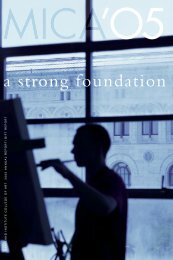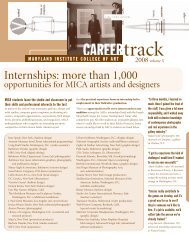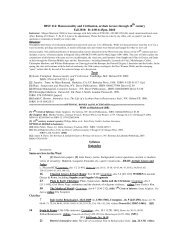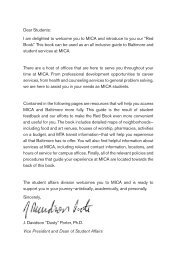art/vision/voice - Maryland Institute College of Art
art/vision/voice - Maryland Institute College of Art
art/vision/voice - Maryland Institute College of Art
You also want an ePaper? Increase the reach of your titles
YUMPU automatically turns print PDFs into web optimized ePapers that Google loves.
100 <strong>art</strong> / <strong>vision</strong> / <strong>voice</strong><br />
educational system <strong>of</strong>ten makes them wary <strong>of</strong> new <strong>of</strong>fers for p<strong>art</strong>icipation.<br />
In several <strong>of</strong> the cases, it is clear that these past histories, and the<br />
accompanying deep sense <strong>of</strong> disenfranchisement, have been a silent<br />
aspect <strong>of</strong> the misunderstandings and misconnections that arise<br />
within the p<strong>art</strong>nerships.<br />
When these cases reveal successes, the lesson is <strong>of</strong>ten that both<br />
process and product are equally important in community-based <strong>art</strong><br />
making. A reciprocal process that results in work based on collaborative<br />
narratives brings together the expertise <strong>of</strong> the <strong>art</strong>ist with the <strong>voice</strong> <strong>of</strong><br />
the community. It requires authentic community p<strong>art</strong>icipation with<br />
the ultimate goal <strong>of</strong> animating the issues, needs, and assets <strong>of</strong> that<br />
community. The products <strong>of</strong> this process will also reflect the <strong>vision</strong> <strong>of</strong><br />
the <strong>art</strong>ist, whose aesthetic must complement the aesthetics inherent in<br />
the community—based in local cultures, histories, and practices.<br />
To better understand communities different from our own, other<br />
models <strong>of</strong> cultural understanding must be applied. In the Reciprocal<br />
University <strong>of</strong> the <strong>Art</strong>s Project at csumb, the cultural citizenship model<br />
has been useful in working with the histories <strong>of</strong> immigrant groups.<br />
Cultural citizenship is, as defined by csumb faculty member Rita<br />
Benjamin, “the ways in which people organize their values, their beliefs<br />
about their rights and their practices based on their sense <strong>of</strong> cultural<br />
belonging rather than their formal status as citizens <strong>of</strong> a nation”<br />
P<strong>art</strong>icularly important are the struggles for space and cultural rights<br />
that shape community identity and connect to an understanding <strong>of</strong><br />
<strong>art</strong>istic responsibility and problem solving that focuses on social<br />
justice and enhancing the role <strong>of</strong> the <strong>art</strong>s.<br />
The cap institutions have learned that the need to better prepare<br />
faculty and students to work in settings unfamiliar to them and to<br />
better understand issues <strong>of</strong> social justice is inherent in cultural work<br />
across communities. Social justice is understood as the distribution<br />
<strong>of</strong> resources to meet the needs <strong>of</strong> all members to be physically and<br />
psychologically safe and secure. In a social justice model, individuals are<br />
both self-determining and able to interact democratically with others.<br />
Students working in communities which have struggled for their rights<br />
must be prepared to reflect on issues <strong>of</strong> power—how the community<br />
senses its potential, where actual power lies, and the nature <strong>of</strong> social<br />
responsibility toward others. In a curriculum that prepares students to<br />
work with respect for community knowledge, justice is a primary value<br />
<strong>of</strong> political life and in the spaces where people live together. Social<br />
justice education is:<br />
Student-centered Collaborative<br />
Experiential Intellectual<br />
Analytical Multicultural<br />
Value-based Activist<br />
Rita Benmayor, “Narrating Cultural Citizenship:<br />
Oral Histories and First Generation Latino and<br />
Latina Students,” New Pedagogies for Social Change,<br />
special issue <strong>of</strong> Social Justice Journal (2003).<br />
Benmayor is on the faculty <strong>of</strong> the csumb<br />
<strong>Institute</strong> for Human Communications.


